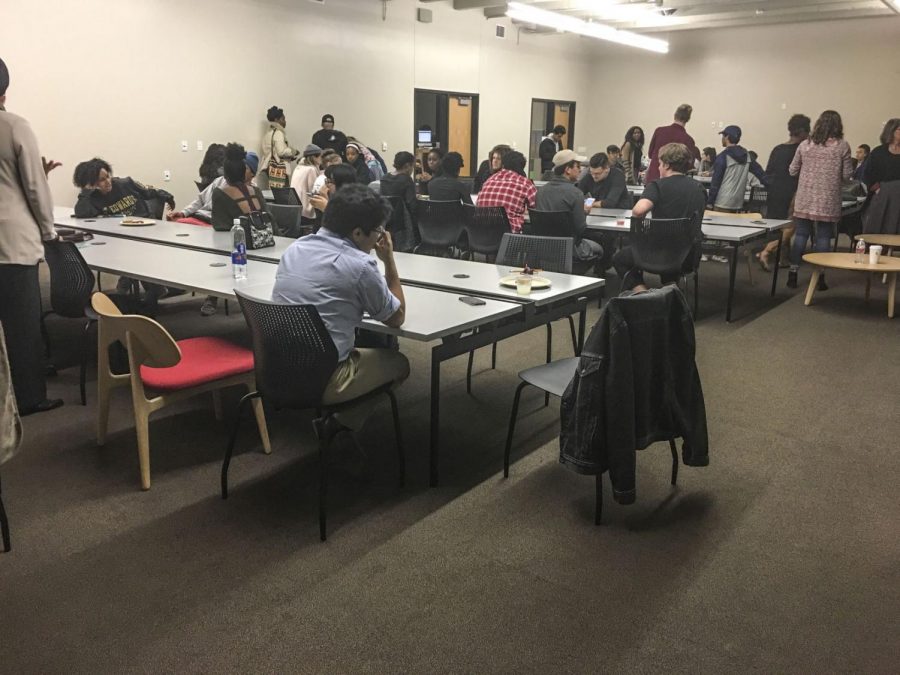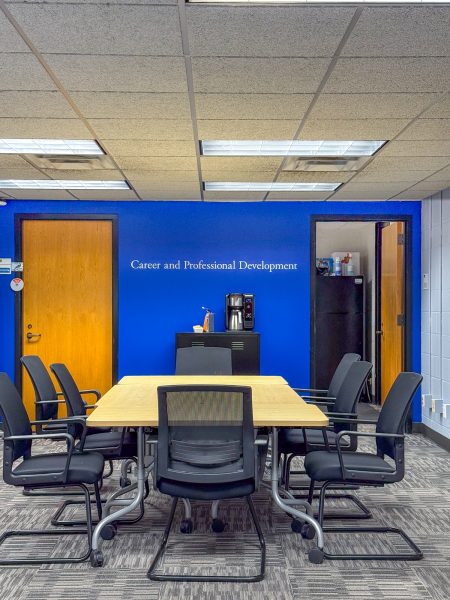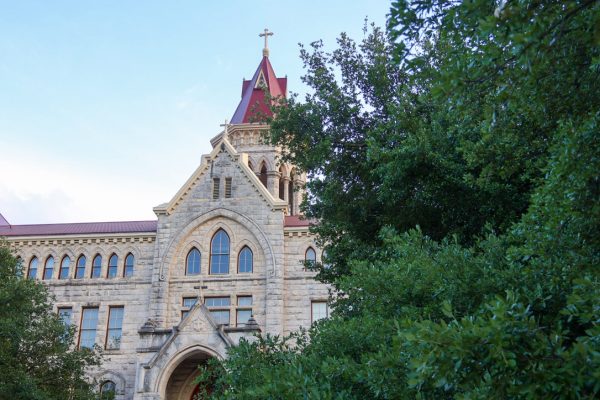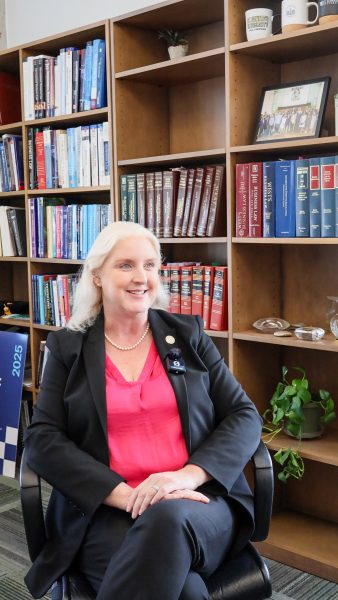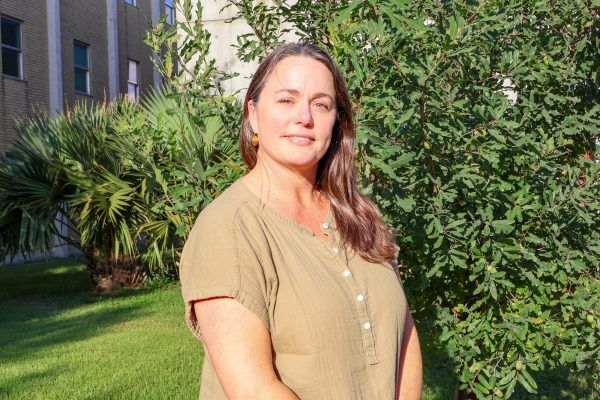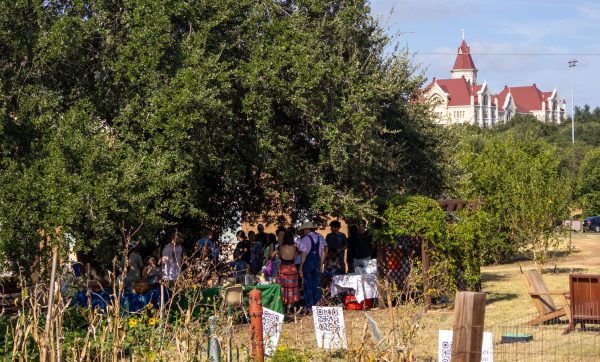BSA’s ‘Ally’ event highlights post-election concerns
Although the Black Student Alliance planned an event to discuss how to be an ally amidst racial divisions, they couldn’t have anticipated how many people would turnout for the event in lieu of the election results.
BSA members, students, faculty, staff and members from the Austin Justice Coalition gathered Nov. 9 in the library.
The room, which has a capacity of nearly 40 people, flooded beyond its maximum, with about 90 community members in attendance. Facilities were forced to bring in additional chairs to accommodate the turnout, according to librarians.
“I think the people who may have needed to be here more than anything, weren’t,” Sophomore De’ja White said. “How are we supposed to create this dialogue if we don’t have the other side?”
White felt that the university needed to start opening conversation on “touchy” subjects like race. The freshman class of 2025 is expected to be the most diverse, with many universities like St. Edward’s experiencing a “college admissions bubble,” according to the Pew Research Center.
“How to Be an Ally,” aimed to discuss the issue of race on campus with prepared questions for panelists followed by a question and answer session. The panel was moderated by BSA secretary Deja Morgan and featured Rachel Neal, associate professor of sociology; Amy Wright, visiting assistant professor of university studies and civil rights scholar; Jennifer Jefferson, visiting assistant professor of university studies; junior Rebecca Darling, sociology major; Teri Varner, associate professor of communication; and Grant Hudson, counselor for the Texas Department of Assistive and Rehabilitative Services.
BSA President Genevia Kanu welcomed the audience, thanked the panelists and addressed “the elephant in the room.”
“This election is affecting us all,” Kanu said. “Although our purpose here is to discuss allyship within the black community, our conversation may open up to how to support those people who are being affected by this.”
Morgan began to facilitate the discussion, beginning with questioning what an ally is.
“It’s important for me to think of allyship as an action and not an identity,” Jefferson said. “Learning yourself and not really expecting someone to teach you.”
“I think of being an ally as an ongoing lifelong process by which I notice my part in systemic racism,” Hudson said.
Varner brought it in the context of the classroom and considered an ally as someone who practiced the golden rule from a position of power.
Wright concurred and told the story of a student on campus who, earlier that day, experienced a racial slur from a group of white students. As a professor, she felt guilty for not being able to be there to intervene.
“Being an ally is having someone’s back. Not when it’s easy,” Wright said. “But, when it’s uncomfortable.”
Morgan asked the panelists when they chose to become allies.
“I think we start out as allies,” Wright said. “Then, we forget. We somehow lose it, right? How do we go back and find that [empathy]?”
The discussion turned to the subject of identity politics and privilege.
Many issues of racism could be dismantled if more people had a sense of obligation to the community to change things systemically, Varner said. The professor expressed frustration about being expected to speak on behalf of an entire group of disenfranchised people as the only minority in the room.
“That’s when I need my ally,” Varner said.
Morgan transitioned into the next question on how to tackle racism.
Jefferson said she tried to reconcile different parts of her identity as white, first generation college student.
“White people: this is on you to be speaking to your white communities,” Jefferson said. “This is a conversation I love BSA is facilitating, but this is also a conversation BSA shouldn’t feel they have to shoulder.”
The audience reverberated, snapping and applauding.
Morgan next asked the question of whether or not solidarity has a different context now, than it did in the Civil Rights Movement.
“I think there’s a threat to everyone at this point who’s going against that silent majority mindset,” Darling said.
A question from the audience asked the panelists to recount their reactions to the election.
Neal remembered getting emails from students the night of the election. Before she arrived on campus she asked herself, “what am I going to tell my students?” Then, she started talking to people and heard stories about students fears.
“I’m a sociologist,” Neal said. “I can talk about the data. I can show you the maps. I can tell you about the polls that came before that hinted at this. But, I am completely heartbroken.”
Wright explained feeling more privileged today than at any other time. She remembered telling her daughter that she was safe because of her white skin color.
“My first reaction was ‘Oh Lord, black Jesus, please help us,’” Varner exclaimed.
The audience burst into laughter.
“I know many people are nowhere near laughing right now, but I laugh to keep from crying,” Varner said.
Neal cited comfort in viewing the election in terms of the bigger, historical picture.
“To some degree, we’ve been here before,” Neal said.
A question from White asked how students should process the aftermath of the election and continue to attend classes.
White told her story of coming to class after prayer and being instructed to play games in a theater class by a professor. She said she felt hurt because the request didn’t allow students like her to process.
The panelists attempted, but struggled to answer her question, but members from the audience chimed in.
A counselor from the Health and Counseling Center reminded students of their services, while another offered their experience.
“A lot of what got me through today was knowing that I was coming here tonight,” the member said.
On the subject, an audience question asked if there was a policy among professors for discussing race.
Professors agreed they aren’t trained to deal with emotional topics in the classroom.
“Professors are vulnerable,” Neal said. “Our jobs are dependent on managing classroom dynamics. If it goes poorly, we may lose our jobs.”
Neal challenged the audience with questions on how many classes are having these conversations.
A lack in raised hands showed the majority of students weren’t.
Neal backtracked to ask if students wanted more classes to discuss race.
The majority of hands raised.
Wright directed students to the feedback page of the website for the General Education Curriculum Renewal Committee.
The event wrapped at the two hour mark.
“Austin is not perfect,” Wright said. “It is at least a better place than others in this state. And this campus is a better place than others in this city. And this room is like the best place on earth right now.”
Sophomore Shehrazad Irani said she felt exposed as a Muslim, gay, woman.
“I feel lighter now,” Irani said. “I feel like I have room to be hopeful.”


